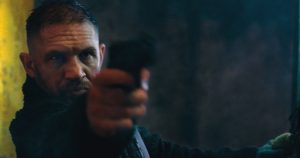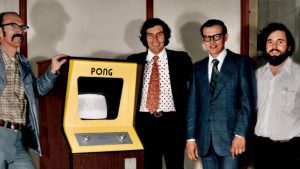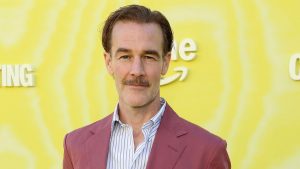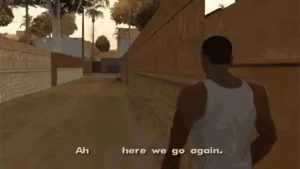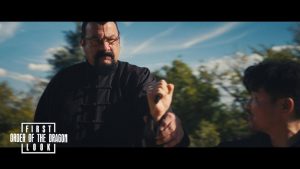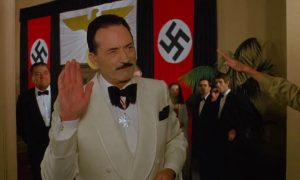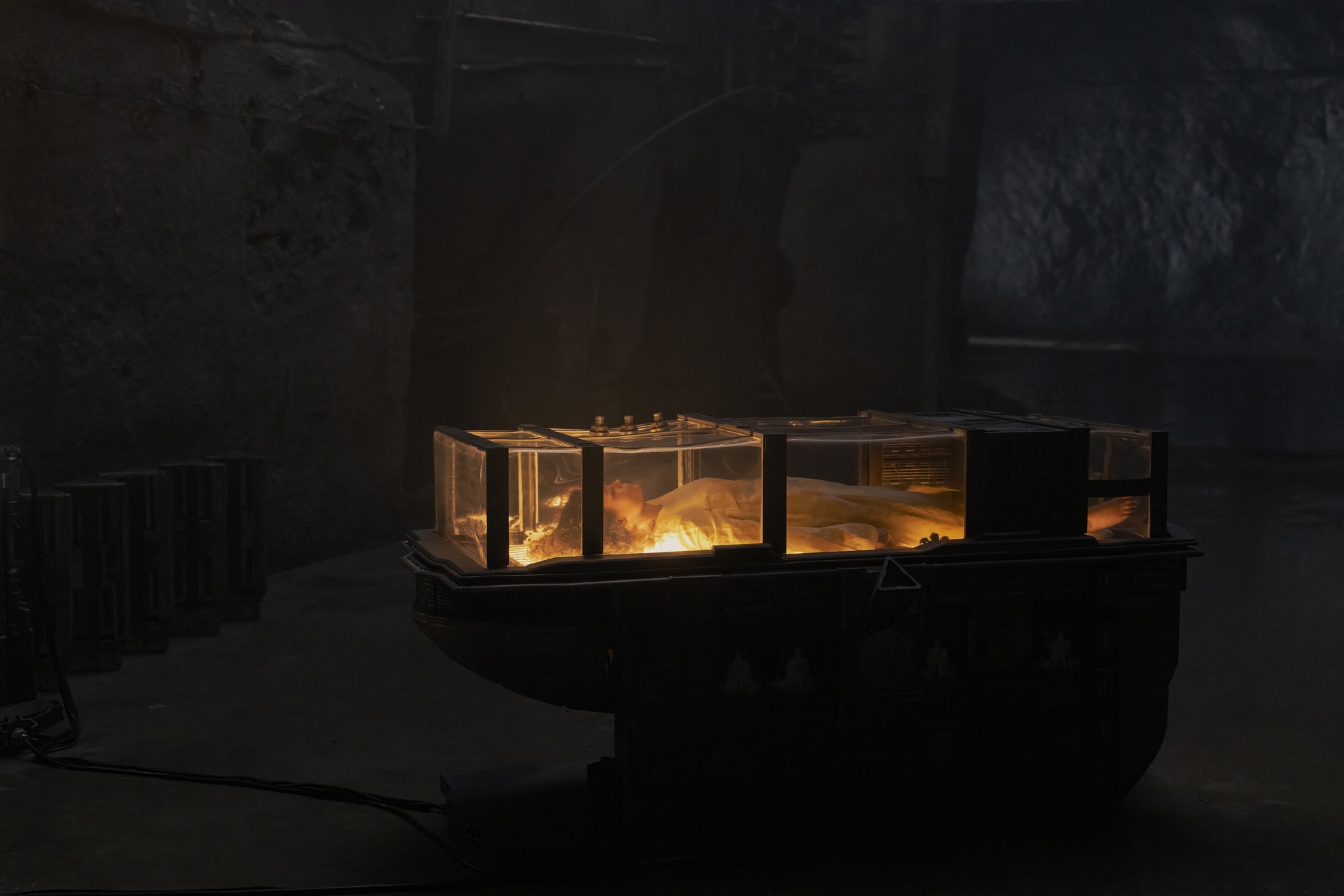
This review contains spoilers for Dune: Prophecy episode 5.
The penultimate episode of Dune: Prophecy answers two big questions about the central mystery of Desmond Hart while leaving another question to linger. By the end of “In Blood, Truth,” we know that Desmond is the son of Tula Harkonnen and Orry Atreides and that he is burning his enemies with a variation of the Omnius plague.
These reveals only heighten the remaining question: “Who cares?”
Please understand, I don’t mean that question as an insult. The Omnius name drop is as ineffective as any other lore wink in Prophecy, but the reveal of Desmond’s parentage calls back to “Sisterhood Above All,” easily the best episode of the series. And Olivia Williams fully embodies the sorrow and guilt that Tula feels when she realizes that the sacrifice she made for Valya’s revenge quest has brought even more suffering. Even better, director Anna Foerster takes the moment slowly, letting the viewers drink in the emotion that manifests in Tula’s silent scream, putting the humanity of the character before the plot mechanics.
That said, most of “In Blood, Truth” works precisely because of its plot mechanics. Make no mistake, the plots are still dumb, especially with Constantine (Josh Heuston) trying to shake off his failson status and impress his father Javicco (Mark Strong). But the plots unfold with actual action and humor, making for the first truly entertaining episode of the series. “In Blood, Truth” doesn’t try for Shakespearean drama or even the Game of Thrones style palace intrigue. Instead, it clears the low bar of pulpy, silly fun.
That fun, unsurprisingly, comes from Travis Fimmel’s Desmond Hart, who gets promoted to Bashar over Javicco’s army. Leading a new elite fighting force (ancestors of the Sardaukar we see in Dune), Hart leads a scourge to root out enemies of the Emperor. In this position, Hart leads a raid on the insurgents and gets to toy with Harrow Harkonnen, whom Edward Davis plays like an Imperial functionary about to be force choked by Darth Vader.
Even Valya finally gets in on the fun. The excellent Emily Watson hasn’t had much success imbuing the one-dimensional Valya with much pathos, so she tries for wit here instead. Watson has a wry wink and a smirk when Valya tells her old friend Mother Francesca (Tabu) about a plan to busy Desmond Hart with his scourge and put Francesca’s son Constantine in charge of the Imperial fleet. She keeps it when Valya belittles and puffs up her nephew Harrow in a single sentence.
Chloe Lea follows in Watson’s approach to play Lila, back from the dead. Lea put in fantastic work in Lila’s earlier appearances, moving from wide-eyed true believer to a young woman dying a horrific death in the Agonies. Here, she plays Lila as possessed by the sense memory of Mother Raquella, which means that she must portray a much older, much wiser woman in the body of a teen.
Lea nails it. Curiosity and faith in her own mission gives Raquella a moral clarity that other characters have lacked, and Lea’s clearly having a ball doing the work. The beat she takes after Raquella in Lila’s body acknowledges the confused and aged Sister Avila (Barbara Marten) shows comic timing this series has lacked.
Still, I know some Dune fans will disagree with my positive assessment of the show’s turn toward the broad. As much as Star Wars borrows from Dune‘s desert planet and space empire, it has no interest in anything beyond popcorn action. Frank Herbert wrote rich and morally complex characters and used fantastic worlds to turn a cynical eye on the concept of human progress. Even a talky book like Dune Messiah was thrilling in the ethical dilemmas it posed.
But as we’ve seen across five episodes, the makers of Dune: Prophecy take those ideas no further than the maxim that power corrupts. So when Desmond begins “In Truth, Blood” by trading his brown togs for the traditional black robes of evil, or when Keiran (Chris Mason) and Mikaela (Shalom Brune-Franklin) whip out swords and fight off the proto-Sardaukar, viewers cannot help but feel relief that the series is staying within its means, limited as they are.
Yes, it would be nice if Dune: Prophecy had a bit more to say about the nature of power, of how a weak buffoon of a leader and a scared populace can embrace fascism, even as the boot heel comes down on those who would lick that boot. The show of power that Javicco displays in the episode’s opening, his rhetoric about strength and safety recalls our current political moment as well as the themes that so interested Herbert. It’s not hard to imagine a better Dune series that could do justice to those ideas.
But that’s not what Dune: Prophecy is, so we come back to my earlier question. Who cares about Desmond Hart’s powers and parentage? Certainly not Dune: Prophecy, which can’t do anything with the concept other than draw a sloppy parallel between Hart and Constantine, both abandoned by their mothers for the Sisterhood. There’s nothing deep or compelling about the reveal, and it doesn’t give us anything we didn’t already have in Fimmel’s bizarre performance.
The fact that “In Truth, Blood” works best when things go boom and actors do funny voices renders any hand-wringing about Hart’s identity useless. Maybe next week’s finale can reproduce the emotional depths of “Sisterhood Above All.” Maybe it can somehow reach the thematic and philosophical depths of the Frank Herbert novels that inspired the series. But if it can’t do either, here’s hoping that the final episode of Dune: Prophecy will stop pretending to care about being smart or interesting, and just embrace its dumb fun, the stuff that made “In Truth, Blood” so honestly enjoyable.
Dune: Prophecy airs Sundays at 9 pm EST on HBO and Max.
Learn more about Den of Geek’s review process and why you can trust our recommendations here.
The post Dune: Prophecy Episode 5 Review – The Origin of Desmond Hart appeared first on Den of Geek.

